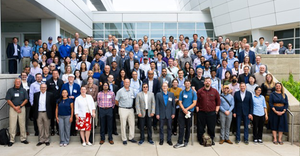RECYCLING: Canadian City Turns Garbage into Gold
January 1, 1998
Dev Tyagi and Stephen Jones
What does a city have to do to win the gold in solid waste management? Just ask one progressive Canadian community, North York, located in Ontario.
Winner of the Solid Waste Association of North America's (Silver Spring, Md.) 1997 Excellence in Municipal Solid Waste Management Recycling Gold Award, the city of North York was recognized for its successful and cost effective recycling and collection programs which it provides to 100,000 single-family households and 110,000 multi-residential units.
What's North York's recipe for success? First, it signed an eight-year agreement in 1995 to sell its mixed paper directly to a paper mill at either a set floor price or the current market value, whichever is greater. Prior to this, the city was paid $18 per tonne (Cdn.) for its paper.
During the public/private partnership's first year, the city was paid in excess of $2.5 million as market prices soared to as high as $290 per tonne (Cdn.).
While North York has benefitted, its private sector partners have profited as well. Until recently, most post-consumer boxboard in Canada was disposed with the regular garbage. In addition, threats of government taxation loomed for non-recycled packaging. Now the paperboard industry has a secure supply of a large quantity of mixed paper to convert to 100 percent recycled paperboard. The end result is a closed loop or "cradle to grave" system.
In addition to generating extra revenue, the city has diverted 37 percent more paper from its landfill than prior to the agreement. The city credits this increase to the use of an additional plastic box, "The Paper Box," which helps the city collect virtually all paper fiber materials.
Approximately 100,000 of these green boxes were distributed to all single-family homes for free by the company purchasing the paper.
The city considered several options for processing its food and beverage container stream, including constructing its own material recovery facility (MRF). One of the paper mill's partners, Metro Waste Paper Recovery, however, developed a processing line and "shoehorned" it into one of its paper processing facilities. The city now has its commingled containers processed and marketed cost effectively and the company fully uses its processing capacity.
North York has reduced its total operating costs significantly. In 1992, its solid waste management cost was 60 percent higher than in 1996. This decrease is due to a number of factors, including better labor force management as well as increased accountability for fleet purchase and maintenance.
Use of "best management" practices and improved labor management has resulted in reduced absenteeism and faster problem resolution. Other changes include switching from a three-person crew to a two-person driver/loader crew for curbside garbage collection.
North York currently is implementing a one-person manual collection system in addition to expanding its automated-side-loading-vehicle collection system, further reducing the crew size.
The city also has developed a number of simple, low cost promotional items, such as flyers (which are mailed with water bills or other city documents) to spur public participation. And, for its part, the city's Environment Committee produced several simple fact sheets.
The result of these efforts was a successful public education program. In fact, North York's residents have the highest knowledge of solid waste management issues when compared to the residents of any other Metro area municipality, according to a recent study of the Region of Metropolitan Toronto.
It's not just about collecting bottles and cans at the curb, though. North York has been a leader in the Province of Ontario for spearheading stronger bottle return policies and advocating product stewardship from industry.
And recently, North York became the first Canadian municipality to propose a service fee by-law in which producers and retailers of liquor, wine and beer in non-returnable containers would pay the city for collecting and processing these containers for recycling or disposal.
Contracts San Diego-based Hardy Instruments Inc. has signed a contract with Garland County, Ark., to provide on-board computer systems and automatic container identification using radio frequency identification for the county's waste collection operations. The contract includes radio frequency tags and readers for 19,000 residential and 500 commercial containers, transfer station spread spectrum radio communications and hardware and software systems for multiple office locations. Hardy also will supply on-board computers for Garland's three private residential hauling companies.
Dames & Moore, Los Angeles, has been awarded an indefinite delivery contract with the U.S. Air Force Center for Environmental Excellence, located at Brooks Air Force Base in Texas, which has an initial contract ceiling of $50 million and a maximum capacity of up to $200 million. Slated tasks include preliminary assessment and site inspections.
You May Also Like


